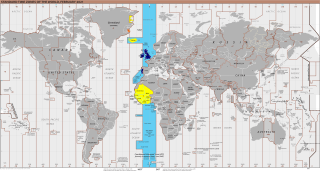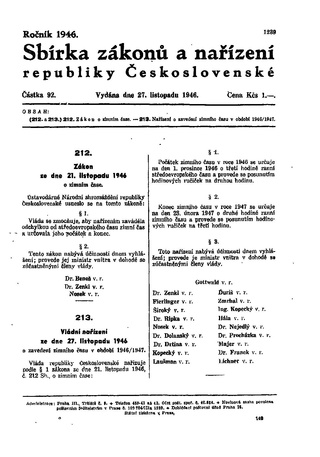
Greenwich Mean Time (GMT) is the local mean time at the Royal Observatory in Greenwich, London, counted from midnight. At different times in the past, it has been calculated in different ways, including being calculated from noon; as a consequence, it cannot be used to specify a particular time unless a context is given. The term GMT is also used as one of the names for the time zone UTC+00:00 and, in UK law, is the basis for civil time in the United Kingdom.

A time zone is an area which observes a uniform standard time for legal, commercial and social purposes. Time zones tend to follow the boundaries between countries and their subdivisions instead of strictly following longitude, because it is convenient for areas in frequent communication to keep the same time.
Universal Time is a time standard based on Earth's rotation. While originally it was mean solar time at 0° longitude, precise measurements of the Sun are difficult. Therefore, UT1 is computed from a measure of the Earth's angle with respect to the International Celestial Reference Frame (ICRF), called the Earth Rotation Angle. UT1 is the same everywhere on Earth. UT1 is required to follow the relationship

Western European Summer Time is a summer daylight saving time scheme, 1 hour ahead of Greenwich Mean Time and Coordinated Universal Time. It is used in:

Central European Time (CET) is a standard time of Central, and parts of Western Europe, which is one hour ahead of Coordinated Universal Time (UTC). The time offset from UTC can be written as UTC+01:00. It is used in most parts of Europe and in a few North African countries. CET is also known as Middle European Time and by colloquial names such as Amsterdam Time, Berlin Time, Brussels Time, Budapest Time, Madrid Time, Paris Time, Rome Time, Prague time, Warsaw Time or Romance Standard Time (RST).

Western European Time is a time zone covering parts of western Europe and consists of countries using UTC±00:00. It is one of the three standard time zones in the European Union along with Central European Time and Eastern European Time.

Standard time is the synchronization of clocks within a geographical region to a single time standard, rather than a local mean time standard. Generally, standard time agrees with the local mean time at some meridian that passes through the region, often near the centre of the region. Historically, standard time was established during the 19th century to aid weather forecasting and train travel. Applied globally in the 20th century, the geographical regions became time zones. The standard time in each time zone has come to be defined as an offset from Universal Time. A further offset is applied for part of the year in regions with daylight saving time.

Summer time in Europe is the variation of standard clock time that is applied in most European countries in the period between spring and autumn, during which clocks are advanced by one hour from the time observed in the rest of the year, with a view to making the most efficient use of seasonal daylight. It corresponds to the notion and practice of daylight saving time (DST) to be found in some other parts of the world.

During British Summer Time (BST), civil time in the United Kingdom is advanced one hour forward of Greenwich Mean Time (GMT), in effect changing the time zone from UTC±00:00 to UTC+01:00, so that mornings have one hour less daylight, and evenings one hour more.

Canada is divided into six time zones. Most areas of the country's provinces and territories operate on standard time from the first Sunday in November to the second Sunday in March and daylight saving time the rest of the year.
Malaysian Standard Time or Malaysian Time (MYT) is the standard time used in Malaysia. It is 8 hours ahead of Coordinated Universal Time (UTC). Malaysia does not observe daylight saving time.

UTC+00:00 is an identifier for a time offset from UTC of +00:00. This time zone is the basis of Coordinated Universal Time (UTC) and all other time zones are based on it. In ISO 8601, an example of the associated time would be written as 2069-01-01T12:12:34+00:00. It is also known by the following geographical or historical names:

UTC−00:25:21 is an identifier for a time offset from UTC of −00:25:21, i.e. twenty-five minutes and twenty-one seconds behind Greenwich Mean Time. This time was used in Ireland between 1880 and 1916.

Railway time was the standardised time arrangement first applied by the Great Western Railway in England in November 1840, the first recorded occasion when different local mean times were synchronised and a single standard time applied. The key goals behind introducing railway time were to overcome the confusion caused by having non-uniform local times in each town and station stop along the expanding railway network and to reduce the incidence of accidents and near misses, which were becoming more frequent as the number of train journeys increased.

Metropolitan France uses Central European Time as its standard time, and observes Central European Summer Time from the last Sunday in March to the last Sunday in October. With its overseas territories, France uses 12 different time zones, more than any other country in the world.

Ireland uses Irish Standard Time in the summer months and Greenwich Mean Time in the winter period.

Denmark, including its dependencies of Faroe Islands and Greenland, uses six time zones.

Winter time is the practice of shifting the clock behind the standard time during winter months, usually −1 hour. It is a form of daylight saving time in which standard time is in effect during summer months, rather than the usual case where standard time is in effect during winter months. However, while summer time is widely applied, use of winter time has been and is very rare.
Time in the Kingdom of the Netherlands is denoted by Central European Time during the winter as standard time in the Netherlands, which is one hour ahead of coordinated universal time (UTC+01:00), and Central European Summer Time (CEST) during the summer as daylight saving time, which is two hours ahead of coordinated universal time (UTC+02:00). The Caribbean Netherlands – which consist of the islands of Bonaire, Sint Eustatius and Saba – all observe Atlantic Standard Time (AST) year-round, which is four hours behind coordinated universal time (UTC−04:00).

Finland uses Eastern European Time (EET) during the winter as standard time and Eastern European Summer Time (EEST) during the summer as daylight saving time. EET is two hours ahead of coordinated universal time (UTC+02:00) and EEST is three hours ahead of coordinated universal time (UTC+03:00). Finland adopted EET on 30 April 1921, and has observed daylight saving time in its current alignment since 1981 by advancing the clock forward one hour at 03:00 EET on the last Sunday in March and back at 04:00 EET on the last Sunday in October, doing so an hour earlier for the first two years.












